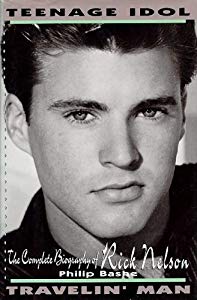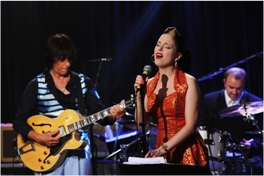The Complete Biography of Rick Nelson, by Philip Bashe
Reviewed by Brian R. Wright
 For some reason around Christmas 2018, I know what it was, I was pondering whether I’d be receiving a card from my former boss, Cathy. We had worked together doing documentation of an EDI [electronic data interchange (paperless business transaction documents)] suite of documents for a company in Livonia, Michigan, back in the 1990s. I’d just recently heard a desultory comment from a current coworker that Rick Nelson’s plane had crashed because he was freebasing cocaine—IOW, the sort of rumor meanspirited people, guided by hearsay, not knowing and not caring, use to dismiss another’s achievement.
For some reason around Christmas 2018, I know what it was, I was pondering whether I’d be receiving a card from my former boss, Cathy. We had worked together doing documentation of an EDI [electronic data interchange (paperless business transaction documents)] suite of documents for a company in Livonia, Michigan, back in the 1990s. I’d just recently heard a desultory comment from a current coworker that Rick Nelson’s plane had crashed because he was freebasing cocaine—IOW, the sort of rumor meanspirited people, guided by hearsay, not knowing and not caring, use to dismiss another’s achievement.
Well, Cathy, whom I really admired professionally and personally, had shared with me a book on Rick Nelson back in those days I worked for her. Turns out she was a major fan of Rick’s music and of Rick the individual. [“Elvis was too full of himself, and, like, a greaser.”] I read the book that she recommended back then and came away quite impressed with Mr. Teenage Idol, as well. In particular, whatever book I read dwelt on the distressing relationship between Nelson and his wife Kris, the drugs and affairs and whatnot—mostly on Kris’s end of the stick. It was a good book, putting Rick mainly in a favorable light. BUT it was NOT this book that I just read and am reviewing here.
Foundation
This book, Teenage Idol, Travelin’ Man, is several cuts above the other one I remember reading in the early 1990s. Mr. Bashe has delivered a remarkable achievement that focuses first and foremost on Rick the musician and on Rick the person. With a full family history and background, especially of the remarkable Ozzie Nelson.
“Oswald George Nelson was born in Jersey city, March 20, 1906…. A voracious reader, Ozzie dog-eared copies of David Copperfield, Tommy Tiptop, the Rover Boys, and especially Horatio Alger’s rags-to-riches boys’ stories. The latter’s recurring theme of infinite possibility had an immense impact on him, as it did on young men as Henry Ford, David Sarnoff, John D. Rockefeller, George Eastman, and Thomas Edison. That they and Ozzie all wound up millionaires might be coincidence. Then again, maybe not: for the honesty and virtue of Alger’s protagonists weren’t their own rewards, but were usually supplemented by cash.”
“Though the public would come to know Ozzie as the indolent, bumbling father he played on the air, in reality he displayed Algeresque drive and ambition his entire life. In addition to becoming the youngest American Eagle Scout on record at 13, Ozzie went on to excel in scholastics, debating, cartooning, and sports…. Ozzie followed his brother Alfred to all-male Rutgers University in New Brunswick, New Jersey,” where at 130# he played running back on the varsity football team. After graduating and enduring many hardships, including his father’s death from a rare bone cancer, superachiever Ozzie developed a thriving entertainment business—band, orchestra, singer, conductor, composer—on the east coast while even earning a law degree. — Pages 4-7
By comparison and contrast, Rick fit the following description:
“Strong-willed professionally, in his private life Rick was passive and reserved, the loyal son of a domineering, ambitious father. Ozzie Nelson, creator and star of an unprecedented radio and television dynasty, directed Rick not only on The Adventures [of Ozzie and Harriet] but off camera as well, and was the most influential person in his life. Rick felt forever torn between his devotion to Ozzie and his desperate need to establish an identity separate from father and family. He became an escape artist, always seeking his independence—from Ozzie; from an unhappy marriage; from adulthood, which Rick resisted like Peter Pan by singing rock & roll; and most of all from the Boy Next Door image that plagued him through the years.” — Page xvii

